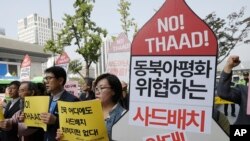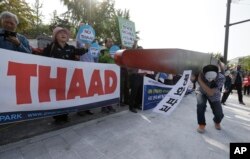Red banners line the winding road that leads up to the Lotte Skyhill Country Club in rural Seongju County. Some of the signs read “We Oppose THAAD” and “THAAD Must Go Back To The US”.
Last month, the South Korean government chose the private golf course, around 220 km south of Seoul, as the deployment site for the U.S. military’s Terminal High Altitude Arial Defense system. THAAD is a missile shield that is expected to be delivered to the peninsula next year and is meant to safeguard against North Korea’s ballistic missiles.
But some residents of the villages that surround the site say they will never allow the American weapons to come to their community.
“We will physically block the missiles in the street if they are brought to the location”, said 59-year-old melon farmer Lee Jeong-hee.
Lee, who recently led a demonstration against the THAAD deployment outside a community center about a kilometer from the golf course, said both Seoul and Washington have not been forthcoming with the risks that the missile system poses to the health of the hundreds of villagers that live and farm in this region.
“The Pentagon needs to answer our questions about electromagnetic waves,” he said, referring to concerns over radiation emitted by the missile battery’s radar system.
A U.S. military spokesperson in Seoul says measures have been taken to safeguard public health around the deployment site.
“The U.S. Department of Defense has imposed the most stringent and restrictive safety measures for the THAAD system,” the spokesperson wrote in an email.
South Korea’s Defense Ministry has pointed out that similar radars are already in place throughout the country, but that has failed to ease the concerns of those in Seongju.
Kang Hee-seong, who runs a small convenience store next to the community center, said he is worried radiation will ruin local crops.
“There are better places to deploy the missiles, somewhere farther away from where people live”, said the 69 year old. “I do not think the U.S. military is considering the feelings of the people who live nearby.”
In the three months since protests against THAAD began in the region, rallies have generally been peaceful and directed at Seoul, but protest leader Lee Jeong-hee said the demonstrators could turn their frustration toward the American military in South Korea if the deployment plan moves forward.
“I think this will start a rise in anti-American feelings here,” he said, adding that he would not be surprised if protestors attack U.S. facilities in South Korea.
While recent polls indicate South Koreans have an overall positive attitude toward the U.S. and its nearly 29,000 soldiers stationed in the country, there are many who do not want that presence to continue.
That is according to David Straub, author of the 2015 book Anti-Americanism in Democratizing South Korea, who said the country’s opposition party could resort to stoking such sentiment in next year’s presidential election.
“A significant part of the (opposition’s) base is quite critical of the United States,” Straub said. “In order to mobilize them they will have to show a little toughness.”
Straub does not think the THAAD issue will result in large-scale protests against the U.S. military like those seen in the early 2000s, but said there is concern locals living near the deployment area could be misled with false information about the missile system.
In one district of Gimcheon City, seven kilometers from the Seongju country club, more protest banners can be spotted hanging from the terraces of newly built apartment towers and on some local businesses.
Lim Sang-won, who displays an anti-THAAD sign atop the front window of his mobile phone shop, said for him and most other people here, there is no anger toward the United States.
“We just think that our own government is ignoring our concerns in favor of keeping good relations with the U.S.,” the 31-year-old said.
Fears over radiation from the THAAD radar are also taking a toll on the district’s housing market, according to a realtor who did not want to give her name.
“Many families just bought apartments here and there is already one school and two more will open soon,” said local resident 38-year-old Baek Seung-hee, a mother of two. “Now, because of THAAD, they just want to move out.”













